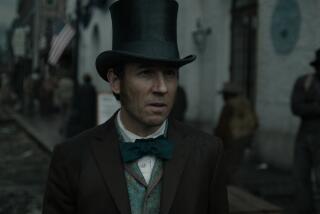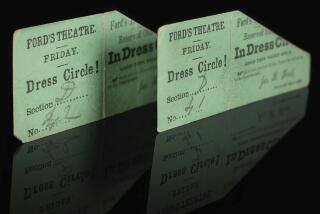In ‘Lincoln,’ a historical lapse
Steven Spielberg’s “Lincoln” has been acclaimed not just by critics but by historians as well for its acute and realistic portrayal of the 16th president as he maneuvered to pass the 13th Amendment, which abolished slavery in the United States. But the filmmakers got at least one detail wrong: They depicted two Connecticut delegates to the House of Representatives voting against the amendment when, in fact, all four of Connecticut’s House members voted for it in 1865. Now, one of the state’s current representatives, Joe Courtney, a Democrat, has written to Spielberg asking if the movie could be corrected before it’s released on DVD.
In a statement, screenwriter Tony Kushner admitted that he deliberately strayed from fact when he put “nay” votes in the mouths of the two Connecticut congressmen — but only to emphasize the dramatic closeness of the vote. He also made up fictitious names for the two lawmakers so he wouldn’t be in the position of showing real people doing something they never did.
Unfortunately, changing the names didn’t really solve the problem. The offending scene may have been only 15 seconds in a 2 1/2-hour movie, as Kushner noted, but those few moments were a part of one of the great moral battles of all time. It’s understandable that the people of Connecticut wouldn’t want to be put unfairly on the wrong side of history.
Of course, “Lincoln” is not a documentary. It’s historical fiction. Spielberg and Kushner were within their rights to take what artistic license they felt was needed, and they did: Dialogue has been created; encounters have been imagined. Nevertheless, the challenge of good historical fiction is to tell a compelling story in the context of history. In the last year, several movies have been criticized for inaccuracies. While “Argo” was based on a now-declassified CIA mission to rescue hostages in Iran, neither viewers nor the filmmakers mistook it for a history lesson. On the other hand, “Zero Dark Thirty,” which opens with a claim that it’s based on firsthand accounts, was assailed for portraying torture as more helpful than it actually was in the search for Osama bin Laden.
“Zero Dark Thirty” director Kathryn Bigelow argues that the truth about the hunt for Bin Laden is still being debated. But that’s not the case with the 13th Amendment. The Connecticut vote may not have been the most significant historical fact of the Lincoln era, but it’s one of the more easily documented. For otherwise meticulous filmmakers to change it so cavalierly was a disappointing lapse in judgment. They’re the artists; they can do what they want. But because Tuesday is Lincoln’s birthday, we’ll take the opportunity to say we’re sorry about that one small choice.
More to Read
A cure for the common opinion
Get thought-provoking perspectives with our weekly newsletter.
You may occasionally receive promotional content from the Los Angeles Times.










